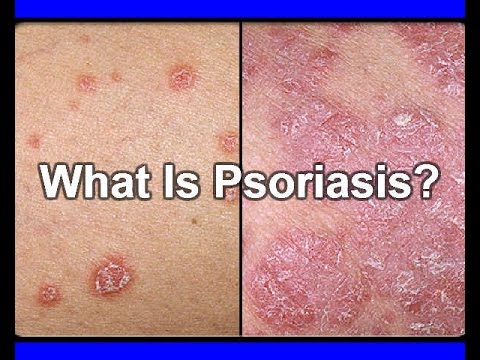What is Psoriasis? Psoriasis is a chronic skin disorder that is marked by patches of intensely itchy and flaky skin that doesn’t go away with regular moisturizers the way most ordinary dry skin will. It can affect any part of the body, even the scalp and nails, and can be mild, moderate or severe. Basic Symptoms Skin itchiness and general discomfort are the two things people most commonly associate with the disease, and it often starts out as no more than brief rashes over certain parts of the body that look like little more than dry skin. As the condition worsens, though, those dry patches tend to get increasingly red and to grow; ultimately, the surface of the skin will dry out and form rough scales that often have a blistered look.
Main Types There are usually five recognized types of the disorder, each with its own intensity and symptom specifications. Plaque psoriasis causes red, silvery-white, scaly skin lesions, and this is the most common variety. The condition can also come in pustular form, which causes blisters to erupt on the skin that can leak pus or other fluids. This variation is most common on the hands and feet. Triggers and Causes The condition is caused by genes, and is usually recognized by those in the medical profession as an inherited genetic disorder. Not everyone who carries the genes for the disorder will necessarily suffer from it, Climate and weather, cold and dry temperatures in particular, can trigger the disease in many people. Physical trauma can also be to blame. Psoriatic lesions often develop at the site of a skin injury, usually right where things are healing and the skin is trying to regenerate itself. Most practitioners also think that stress and emotional health play a role in symptom suppression and flare-ups.
People who are under a great deal of stress often see the condition appear for the first time, or worsen if it is already present. Treatment Options There isn’t usually any way to completely cure the condition, insofar as it is not medically possible to re-code peoples’ genetic predispositions. Certain medications and treatment regimens can help keep flare-ups suppressed, though, and can dramatically alter patients’ quality of and enjoyment of life. Skincare experts usually start by looking for ways to reduce triggers. Medicated creams and ointments are commonly prescribed, and in some cases UV light therapy, also known as “phototherapy,” can be useful, particularly for people who live in relatively dark and cold climates or who spend most of their days indoors away from natural sunlight..
